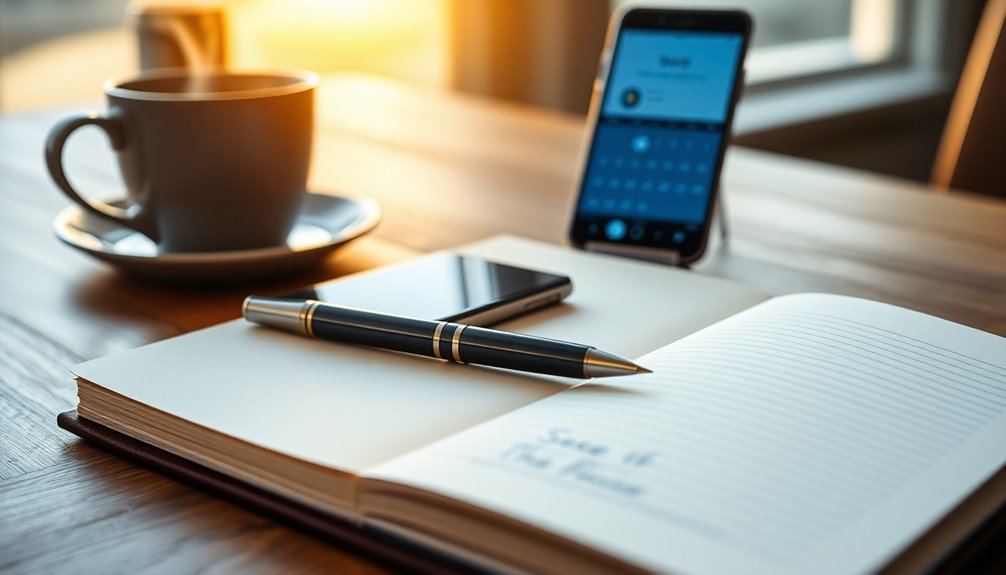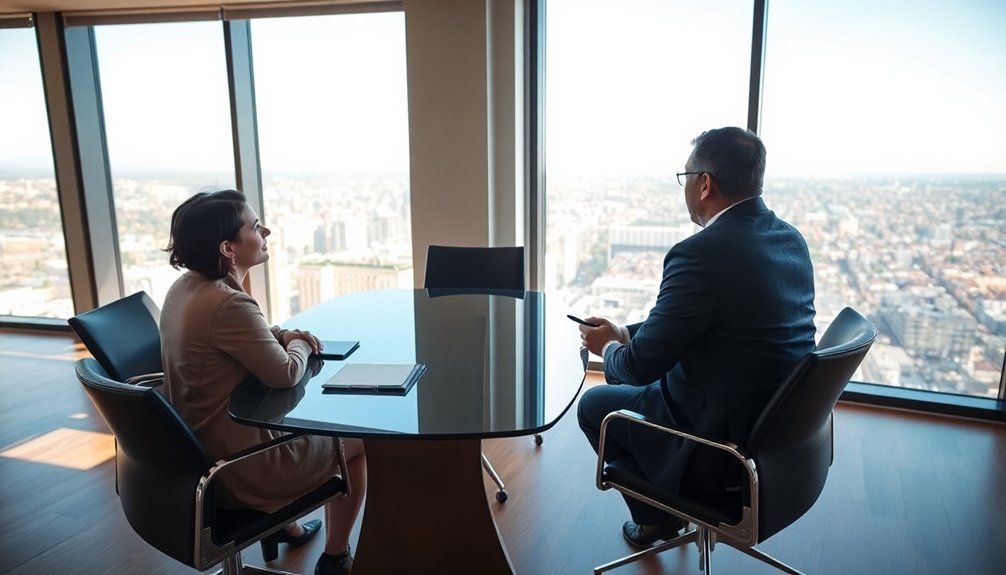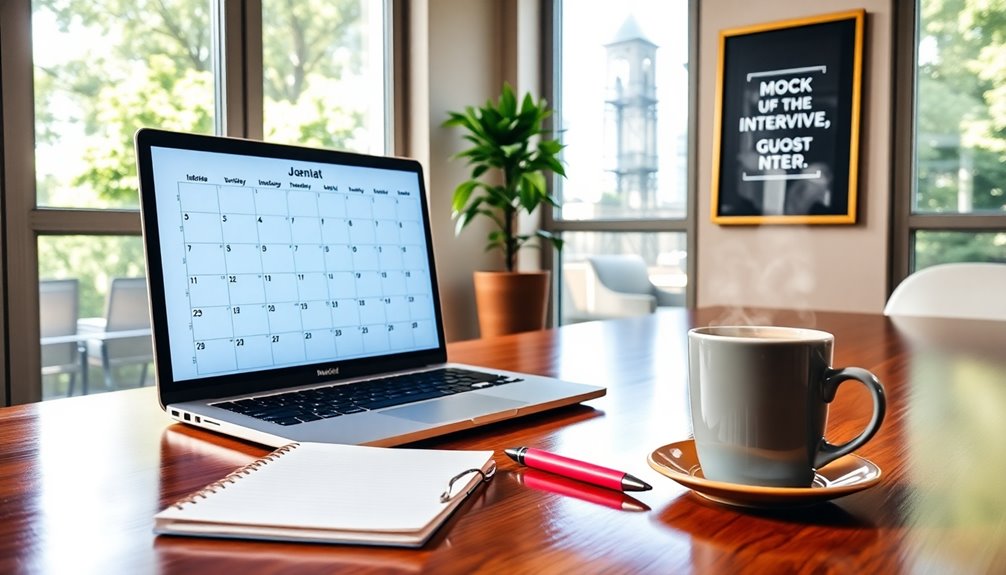Revealing the secrets of interview duration can really boost your confidence and time management. Phone interviews usually last 15 to 40 minutes, while in-person ones range from 45 to 90 minutes. Video interviews vary too, offering flexibility from 15 to 90 minutes. Factors like question types, interview format, and position complexity can stretch or shorten the time. Your preparation is key; concise answers keep the flow smooth. Signs of success include an engaging discussion and detailed questions about your experience. If you want to master this topic further, there's plenty more to explore on what influences length and success in interviews.
Key Takeaways
- Interview durations vary widely, ranging from 15 minutes for phone interviews to several hours for in-depth discussions.
- Phone interviews typically last 30 minutes, while in-person interviews can extend from 45 to 90 minutes.
- The type of questions asked, such as open-ended versus closed, significantly impacts the length of the interview.
- Factors like candidate qualifications and the complexity of the position can lead to longer interview discussions.
- Engaging conversations and detailed questions from interviewers often indicate a successful and potentially lengthy interview experience.
Overview of Interview Duration
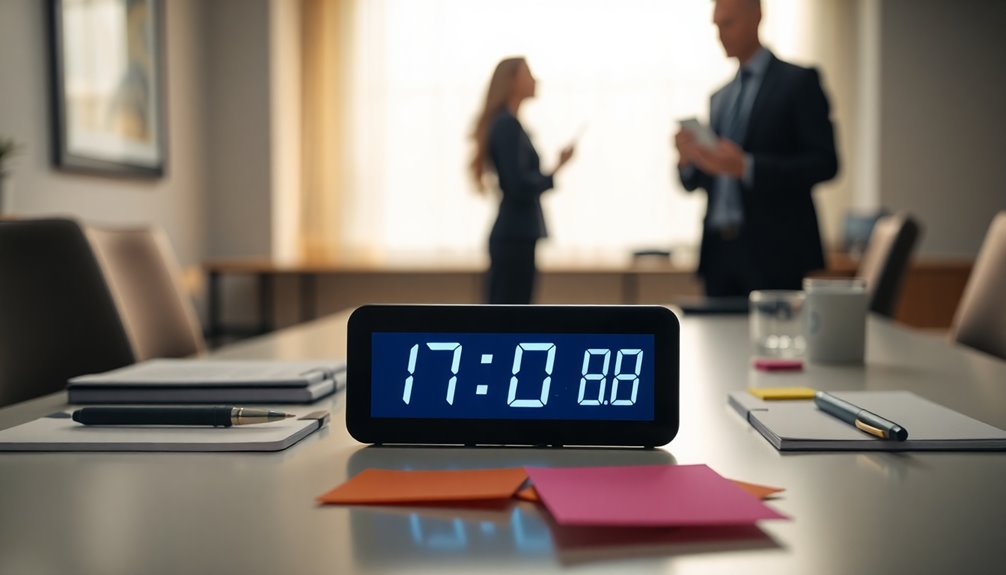
When you prepare for an interview, it's crucial to understand that durations can vary markedly. Interviews can last anywhere from 15 minutes to several hours, depending on their structure and type.
For instance, initial phone interviews typically range from 15 to 40 minutes. In-person interviews, however, often take between 45 and 90 minutes, while group interviews usually last around one hour.
Knowing these typical lengths helps you manage your time effectively and schedule other obligations. By being aware of the expected duration, you can better prepare, ensuring you allocate enough time for each interview type.
This knowledge also allows you to stay focused and calm, making the most of your opportunities to impress potential employers.
Common Interview Types

Interviews come in various types, each designed to evaluate candidates in unique ways.
Phone interviews are often the first step, lasting around 30 minutes and focusing on your basic qualifications. If you progress, in-person interviews typically last 45-90 minutes, diving deeper into your skills and experiences.
Video interviews have gained popularity, usually ranging from 15 to 90 minutes, offering flexibility without sacrificing depth.
Technical interviews, emphasizing specific skills, generally last 45-60 minutes and may involve hands-on tasks.
Group interviews bring multiple candidates together, usually lasting about an hour, testing your ability to collaborate and stand out.
Finally, panel interviews often take over an hour, featuring a team of interviewers evaluating your fit for the role.
Factors Affecting Length
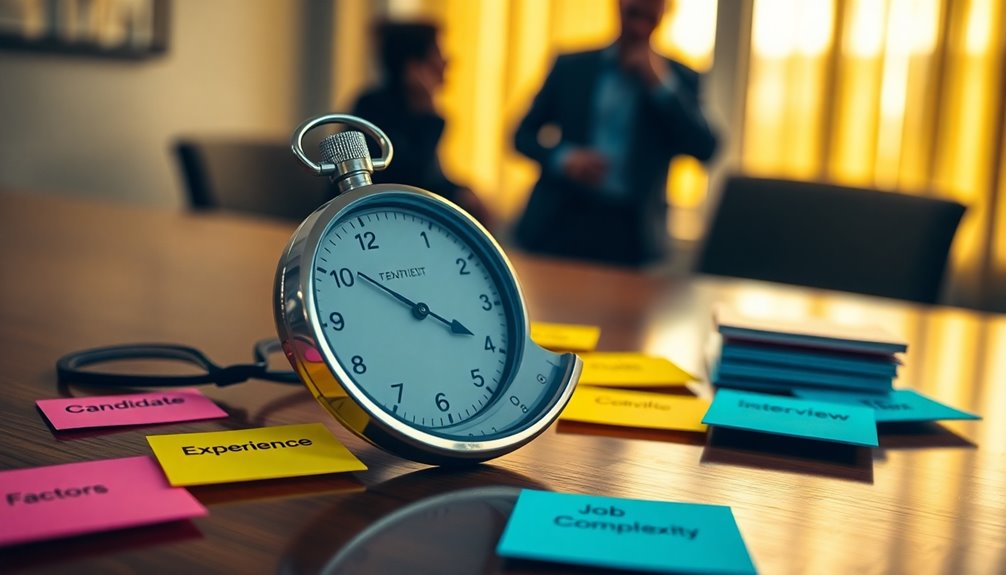
Several factors can influence the length of an interview, impacting how the process unfolds.
The type of questions you encounter plays a significant role; open-ended inquiries often require more time for detailed responses. Your qualifications can also affect duration; if you're a strong fit, the interviewer may dive deeper into your experiences.
Additionally, the complexity of the position can lead to longer discussions, as more details need addressing. The format—whether in-person, phone, or video—can dictate pacing and flow.
Finally, your ability to provide concise, relevant answers can help keep the interview on track. Being aware of these factors can help you manage your expectations and prepare effectively for your interviews.
Effective Interview Preparation
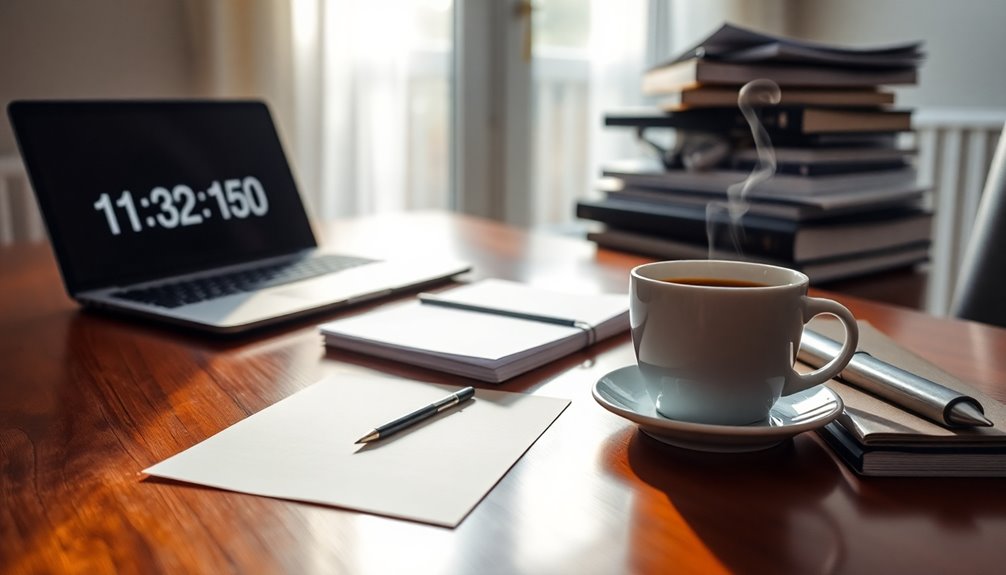
Effective interview preparation is essential for making a positive impression and increasing your chances of success. Start by developing an interview plan that keeps you focused on relevant topics. Prepare answers for common questions and tailor a list of insightful questions to ask the interviewer.
Arriving early shows professionalism, so make sure you have all necessary documents ready. If it's a virtual interview, check your technology and materials beforehand to avoid hiccups.
During the interview, stay concise and avoid digressing into unrelated topics to maintain engagement. This preparation not only boosts your confidence but also demonstrates your interest in the position and company culture, paving the way for a more effective interview experience.
Signs of a Successful Interview

After preparing thoroughly for your interview, you'll want to recognize the signs that indicate it's going well. One key sign is the engaging flow of conversation—if the interviewer seems genuinely interested in your responses, that's a positive indicator.
When they ask detailed questions about your experience and skills, it shows they're considering you seriously. If the discussion strays into relevant topics that showcase your qualifications, that's another good sign.
Additionally, if the interviewer poses multiple questions, it suggests they're thoroughly evaluating your fit for the role.
Finally, if time seems to fly by, it often indicates a successful connection. Trust your instincts; if you feel good about the interview, you might've made a lasting impression. Furthermore, a positive interview experience can lead to opportunities for future career advancement as the interviewer may view you as a strong candidate for other roles within the company.
Managing Your Time
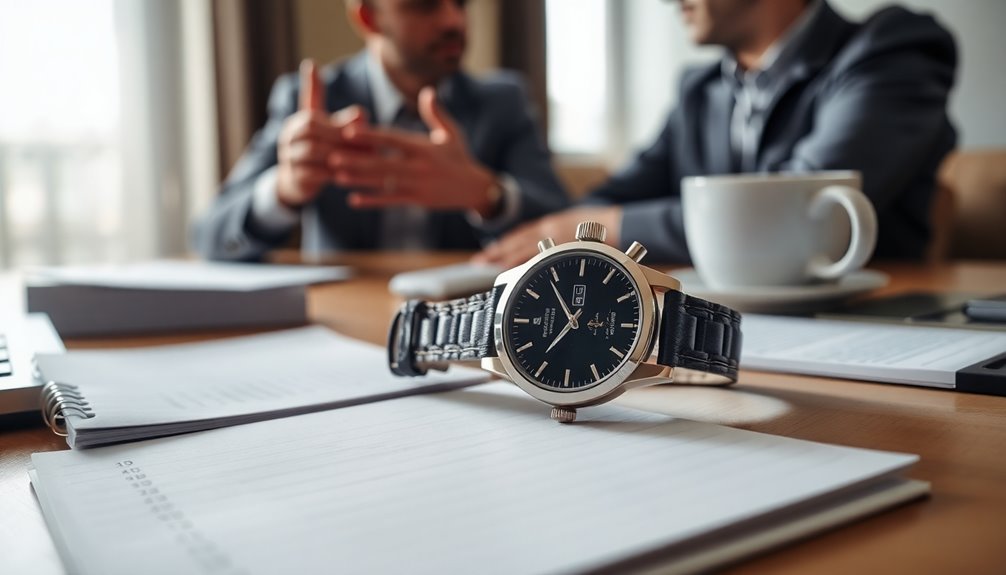
Time management is essential during the interview process, as it can greatly influence your performance and perceived professionalism.
To effectively manage your time, start by researching the average length of the interview type you're facing. Allocate specific times to prepare your responses and questions, ensuring you cover all key points without rambling.
During the interview, listen carefully and keep your answers concise to maintain engagement. If you notice the conversation drifting off-topic, gently steer it back to relevant points.
Finally, practice pacing your responses, so you can cover everything needed without feeling rushed. Remember, demonstrating good time management reflects not only your communication skills but also your respect for the interviewer's time.
Follow-Up Strategies
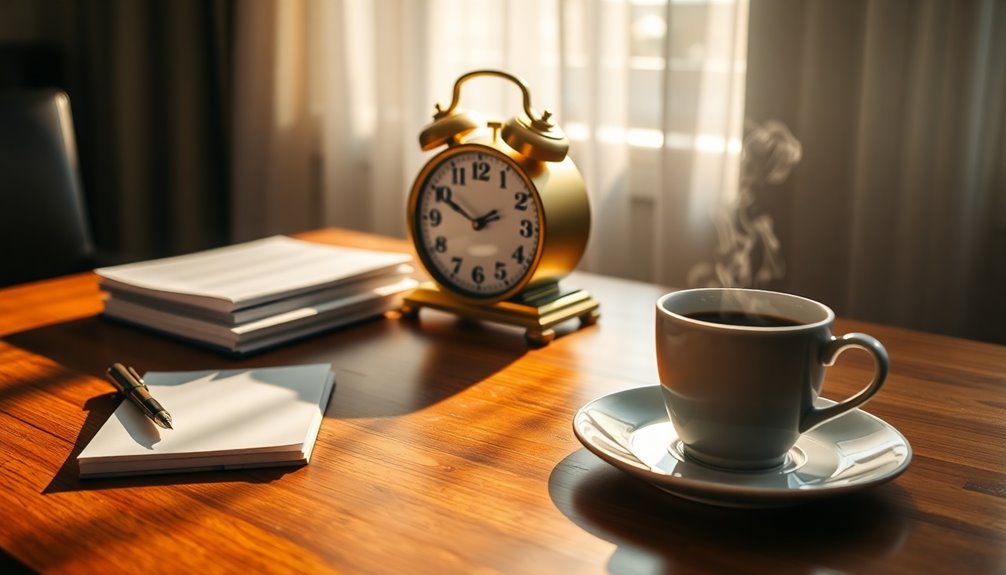
Following up after an interview is essential; it not only reinforces your interest in the position but also keeps you fresh in the interviewer's mind. A well-timed follow-up can set you apart from other candidates.
Here's a quick guide to effective follow-up strategies:
| Action | Timing | Medium |
|---|---|---|
| Send a thank you email | Within 24 hours | |
| Connect on LinkedIn | Within a week | |
| Inquire about next steps | 1-2 weeks later | Email or phone call |
Frequently Asked Questions
What Should I Wear to an Interview of Any Duration?
When you're preparing for an interview, it's essential to choose the right outfit.
Opt for professional attire that reflects the company's culture. A suit or dress shirt with slacks is generally a safe choice. Avoid overly casual clothing like jeans or sneakers.
Make sure your outfit is clean and well-fitted, as this shows respect for the interview process.
Don't forget to take into account comfort, since you'll want to feel at ease during the conversation.
How Do I Handle Difficult Interview Questions?
When the heat's on, handling difficult interview questions can feel like walking a tightrope. Stay calm and take a moment to gather your thoughts before answering.
It's okay to ask for clarification if you don't understand. Use the STAR method—Situation, Task, Action, Result—to structure your responses effectively.
Can I Reschedule an Interview if Needed?
Yes, you can reschedule an interview if needed.
It's best to communicate as soon as possible, preferably via email or a phone call. Be polite and express your reasons clearly, showing appreciation for their understanding.
Suggest alternative dates and times that work for you. Most employers appreciate honesty and flexibility, so don't hesitate to ask for a reschedule.
Just guarantee you remain professional throughout the process.
What Should I Do if the Interview Runs Over Time?
Did you know that 60% of candidates feel anxious when interviews run over time?
If your interview exceeds the scheduled duration, don't panic. Stay engaged and continue answering questions thoughtfully.
Politely gauge the interviewer's time by asking if they've a few more minutes. If they do, maintain your focus and enthusiasm.
If they seem rushed, offer to wrap up, ensuring you express gratitude for the opportunity and your willingness to discuss further later.
Are There Any Specific Interview Etiquette Tips to Follow?
When you're in an interview, it's important to follow certain etiquette tips.
Arrive early to show punctuality and respect for the interviewer's time. Dress appropriately and maintain eye contact to convey confidence.
Listen actively, and don't interrupt when they speak. Prepare thoughtful questions, and express gratitude at the end.
Remember to follow up with a thank-you email, reinforcing your interest and appreciation for the opportunity.
These actions can leave a lasting impression.
Conclusion
As you step away from your interview, remember that every moment spent in front of potential employers is a seed planted in the garden of your career. Embrace the varying lengths of interviews as opportunities for growth and connection. By understanding the nuances of interview duration, you can navigate this landscape with confidence. Keep nurturing those seeds with effective preparation and follow-up strategies, and watch your career blossom into something beautiful.


